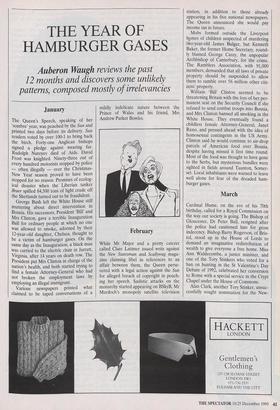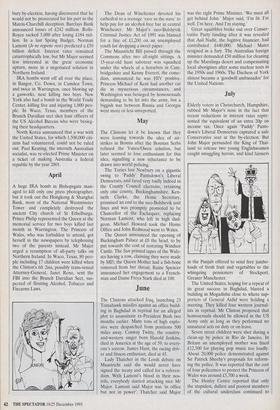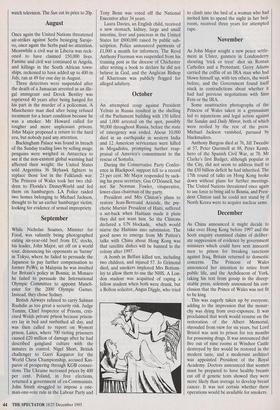THE YEAR OF HAMBURGER GASES
Auberon Waugh reviews the past
12 months and discovers some unlikely patterns, composed mostly of irrelevancies
January
The Queen's Speech, speaking of her `sombre' year, was poached by the Sun and printed two days before its delivery. Sun readers voted by over 100-1 to bring back the birch. Forty-one Anglican bishops signed a pledge against wearing fur. Rudolph Nureyev died of Aids. David Frost was knighted. Ninety-three out of every hundred motorists stopped by police — often illegally — over the Christmas- New Year season proved to have been stopped for no reason. Promises of ecolog- ical disaster when the Liberian tanker Braer spilled 84,500 tons of light crude off the Shetlands turned out to be fraudulent.
George Bush left the White House still muttering about direct intervention in Bosnia. His successors, President 'Bill' and Mrs Clinton, gave a terrible Inauguration Ball for ordinary people at which no one was allowed to smoke, adorned by their 12-year-old daughter, Chelsea, thought to be a victim of hamburger gases. On the same day as the Inauguration, a black man was carried to the electric chair in Jarratt, Virginia, after 14 years on death row. The President put Mrs Clinton in charge of the nation's health, and both started trying to find a female Attorney-General who had not broken the employment laws by employing an illegal immigrant. Various newspapers printed what claimed to be taped conversations of a mildly indelicate nature between the Prince of Wales and his friend, Mrs Andrew Parker Bowles.
February
While Mr Major and a pretty caterer called Clare Latimer issued writs against the New Statesman and Scallywag maga- zine claiming libel in references to an affair between them, the Queen perse- vered with a legal action against the Sun for alleged breach of copyright in poach- ing her speech. Sadistic attacks on the monarchy started appearing on BSkyB, Mr Murdoch's monopoly satellite television
station, in addition to those already appearing in his five national newspapers. The Queen announced she would pay income tax in future.
Mobs formed outside the Liverpool h2mes of children suspected of murdering two-year-old James Bulger, but Kenneth Baker, the former Home Secretary, round- ly blamed George Carey, the unpopular Archbishop of Canterbury, for the crime. The Ramblers Association, with 91,000 members, demanded that all laws of private property should be suspended to allow them to ramble over 56 million other citi- zens' property.
William 'Bill' Clinton seemed to be threatening Britain with the loss of her per- manent seat on the Security Council if she refused to send combat troops into Bosnia, and Mrs Clinton banned all smoking in the White House. They eventually found a childless female Attorney-General, Janet Reno, and pressed ahead with the idea of homosexual contingents in the US Army. Clinton said he would continue to air-drop parcels of American food over Bosnia, despite having missed it first time round. Most of the food was thought to have gone to the Serbs, but mysterious bundles were sighted in fields around Taunton, Somer- set. Local inhabitants were warned to leave well alone for fear of the dreaded ham- burger gases.
March
Cardinal Hume, on the eve of his 70th birthday, called for a Royal Commission on the way our society is going. The Bishop of Gloucester, Dr Peter Ball, resigned after the police had cautioned him for gross indecency. Bishop Barry Rogerson, of Bris- tol, stood up in the House of Lords to demand an imaginative redistribution of wealth to give everyone a free home. Miss Ann Widdecombe, a junior minister, and one of the Tory Stinkers who voted for a ban on hunting in the St Valentine's Day Debate of 1992, celebrated her conversion to Rome with a special service in the Crypt Chapel under the House of Commons.
Alan Clark, another Tory Stinker, unsuc- cessfully sought nomination for the New- bury by-election, having discovered that he would not be prosecuted for his part in the Matrix-Churchill deception. Barclays Bank announced losses of £242 million. Rolls- Royce sacked 5,000 after losing £184 mil- lion. In a last Spring Budget, Norman Lamont (Je ne regrette rien) predicted a £50 billion deficit. Interest rates remained catastrophically low, but Mr Major seemed less interested in the great economic upturn, more in a negotiated solution in Northern Ireland.
IRA bombs went off all over the place, in Bangor, Co. Down, in Camden Town, and twice in Warrington, once blowing up a gasworks, next killing two boys. New York also had a bomb in the World Trade Center, killing five and injuring 1,000 peo- ple. In Waco, Texas, members of the Branch Davidian sect shot four officers of the US Alcohol Bureau who were besieg- ing their headquarters.
North Korea announced that a war with the United States, for which 1,500,000 citi- zens had volunteered, could not be ruled out. Paul Keating, the uncouth Australian socialist, was re-elected Prime Minister on a ticket of making Australia a federal republic by the year 2001.
April
A huge IRA bomb in Bishopsgate man- aged to kill only one press photographer, but it took out the Hongkong & Shanghai Bank, most of the National Westminster Tower and completely destroyed the ancient City church of St Ethelburga. Prince Philip represented the Queen at the memorial service for two boys killed last month in Warrington. The Princess of Wales, who was forbidden to attend, got herself in the newspapers by telephoning two of the parents instead. Mr Major urged a resumption of all-party talks on Northern Ireland. In Waco, Texas, 80 peo- ple including 17 children were killed when the Clinton's 6ft 2ins, possibly trans-sexual Attorney-General, Janet Reno, sent the FBI into the Branch Davidian Sect, sus- pected of flouting Alcohol, Tobacco and Firearms Laws. The Dean of Winchester devoted his cathedral to a teenage 'rave in the nave' to help pay for an alcohol-free bar in central Winchester. Mr Major's neo-Bolshevik Criminal Justice Act of 1991 was blamed for a fine of £1,200 on an unemployed youth for dropping a sweet paper.
The Maastricht Bill passed through the Commons after two all-night sittings. A 15-year-old hunt saboteur was squashed under the wheels of a horsebox in Cam- bridgeshire and Kenny Everett, the come- dian, announced he was HIV positive. Princess Michael of Kent had another cat die in mysterious circumstances, and Washington was besieged by homosexuals demanding to be let into the army, but a biggish war between Russia and Georgia went more or less unreported.
May
The Clintons let it be known that they were leaning towards the idea of air- strikes in Bosnia after the Bosnian Serbs refused the Vance/Owen solution, but later seemed to lose enthusiasm for this idea, signalling a new reluctance to be drawn into world policing.
The Tories lost Newbury on a gigantic swing to 'Paddy' Pantsdown's Liberal Democrats, and fared very badly indeed in the County Council elections, retaining only one county, Buckinghamshire. Ken- neth Clarke, the Home Secretary, promised an end to the neo-Bolshevik unit fines and was promptly promoted to be Chancellor of the Exchequer, replacing Norman Lamont, who left in high dud- geon. Michael Howard took the Home Office and John Redwood went to Wales.
The Queen announced the opening of Buckingham Palace at £8 the head, to be put towards the cost of restoring Windsor Castle. The Sun printed tapes of the Wale- ses having a row, claiming they were made by MI5; the Queen Mother had a fish-bone removed from her throat; Raine Spencer announced her engagement to a French- man and Dame Freya Stark died at 100.
June
The Clintons attacked Iraq, launching 23 Tomahawk missiles against an office build- ing in Baghdad in reprisal for an alleged plot to assassinate ex-President Bush two months earlier. Many tons of high explo- sive were despatched from positions 500 miles away. Conway Twitty, the country- and-western singer born Harold Jenkins, died in America at the age of 59, to every- one's sorrow. James Hunt, the racing driv- er and fitness enthusiast, died at 45.
Lady Thatcher in the Lords debate on Maastricht said she would never have signed the treaty and called for a referen- dum. With Lamont's blood in their nos- trils, everybody started attacking nice Mr Major. Lamont said Major was 'in office but not in power'. Thatcher said Major was the right Prime Minister. 'We must all get behind John.' Major said, 'I'm fit. I'm well. I'm here. And I'm staying.'
Great squabbles broke out over Conser- vative Party funding after it was revealed that Asil Nadir, the fugitive financier, had contributed £440,000. Michael Mates resigned in a fury. The Australian foreign minister demanded £50 million for cleaning up the Maralinga desert and compensating local aborigines after some nuclear tests in the 1950s and 1960s. The Duchess of York almost became a 'goodwill ambassador' for the United Nations.
July
Elderly voters in Christchurch, Hampshire, rubbed Mr Major's nose in the fact that recent reductions in interest rates repre- sented the equivalent of an extra 20p on income tax. Once again 'Paddy' Pants- down's Liberal Democrats captured a safe Conservative seat at the by-election. But John Major persuaded the King of Thai- land to release two young Englishwomen caught smuggling heroin, and kind farmers in the Punjab offered to send free jumbo- oads of fresh fruit and vegetables to the whingeing pensioners of Stockport, Greater Manchester.
The United States, hoping for a repeat of its great success in Baghdad, blasted a building in Mogadishu close to where sup- porters of General Aidid were holding a meeting. They killed four western journal- ists in reprisal. Mr Clinton proposed that homosexuals should be allowed in the US Army only as long as they performed no unnatural acts on duty or on leave.
Seven street children were shot during a clean-up by police in Rio de Janeiro. In Britain an unemployed mother was fined £12,500 for playing pop music too loudly. About 20,000 police demonstrated against Sir Patrick Sheehy's proposals for reform- ing the police. It was reported that the cost of four policemen to protect the Princess of Wales was around £5,700 a week.
The Henley Centre reported that only the stupidest, dullest and poorest members of the cultural underclass continued to
watch television. The Sun cut its price to 20p.
August
Once again the United Nations threatened air-strikes against Serbs besieging Saraje- vo, once again the Serbs paid no attention. Meanwhile a civil war in Liberia was reck- oned to have claimed 150,000 lives. Famine and civil war continued in Angola, and killings in the South African town- ships, reckoned to have added up to 400 in July, ran at 49 for one day in August.
Three detectives were suspended after the death of a Jamaican arrested as an ille- gal immigrant and Derek Bentley was reprieved 40 years after being hanged for his part in the murder of a policeman. A Manchester man died after being refused treatment for a heart condition because he was a smoker. Mr Howard called for tougher and more unpleasant prisons. John Major proposed a return to the hard ecu, but nobody paid any attention.
Buckingham Palace was found in breach of the Sunday trading laws by selling mugs; penguins were weighed in Antarctica to see if the non-existent global warming had affected their weight; the United States sold Argentina 36 Skyhawk fighters to replace those lost in the Falklands war. The Princess of Wales took her two chil- dren to Florida's DisneyWorld and fed them on hamburgers. LA Police raided two homes belonging to Michael Jackson, thought to be an earlier hamburger victim, looking for evidence of sexual impropriety.
September
While Nicholas Soames, Minister for Food, was valiantly being photographed eating six-year-old beef from EC stocks, his leader, John Major, set off on a world tour, denouncing his opponents as 'barmy' in Tokyo, where he failed to persuade the Japanese to pay further compensation to former PoWs; in Malaysia he was insulted for Britain's policy in Bosnia; in Monaco he failed to persuade the International Olympic Committee to appoint Manch- ester for the 2000 Olympic Games. Instead, they chose Sydney.
British Airways refused to carry Salman Rushdie as too great a security risk. Judge Tumim, Chief Inspector of Prisons, criti- cised Wolds private prison because prison- ers lay in bed and sunbathed all day, and was then called to report on Wymott prison, Lancs, where 700 rioting prisoners caused £20 million of damage after he had described gangland culture with the inmates in control. Nigel Short, British challenger to Garri Kasparov for the World Chess Championship, accused Kas- parov of prospering through KGB connec- tions, The Ukraine increased prices by 400 per cent. Poland, in free elections, returned a government of ex-Communists. John Smith struggled to impose a one- man-one-vote rule in the Labour Party and Tony Benn was voted off the National Executive after 34 years.
Laura Davies, an English child, received a new stomach, kidney, large and small intestine, liver and pancreas in the United States for £800,000 raised by public sub- scription. Police announced payments of £1,000 a month for informers. The Revd Anthony Freeman was suspended from his training post in the diocese of Chichester after writing a book to declare he did not believe in God, and the Anglican Bishop of Khartoum was publicly flogged for alleged adultery.
October
An attempted coup against President Yeltsin in Russia resulted in the shelling of the Parliament building with 150 killed and 1,000 arrested on the spot, possibly 90,000 throughout Russia, before the state of emergency was ended. About 10,000 died in an earthquake in western India and 12 American servicemen were killed in Mogadishu, prompting further reap- praisal of America's commitment to the rescue of Somalia.
During the Conservative Party Confer- ence in Blackpool, support fell to a record 23 per cent. Mr Major responded by sack- ing his press secretary, Gus O'Donnell, but not Sir Norman Fowler, vituperative, lower-class chairman of the party.
President and Mrs Clinton's plans to restore Jean-Bertrand Aristide, the psy- chotic Marxist President of Haiti, suffered a set-back when Haitians made it plain they did not want him. So the Clintons declared a UN blockade, which would starve the Haitians into submission. The good news to emerge from Mr Patten's talks with China about Hong Kong was that satellite dishes will be banned in the colony after 1997.
A bomb in Belfast killed ten, including two children, and injured 57. Jo Grimond died, and smokers implored Mrs Bottom- ley to allow them to use the NHS. A Lon- don student was acquitted of raping a fellow student when both were drunk, but a Bolton solicitor, Angus Diggle, who tried to climb into the bed of a woman who had invited him to spend the night in her bed- room, received three years for attempted rape.
November
As John Major sought a new peace settle- ment in Ulster, gunmen in Londonderry shouting 'trick or treat' shot six Roman Catholics and a Protestant. Gerry Adams carried the coffin of an IRA man who had blown himself up, with ten others, the week before, and the Government found itself stuck in contradictions about whether it had had previous negotiations with Sinn Fein or the IRA.
Some unattractive photographs of the Princess of Wales taken in a gymnasium led to injunctions and legal action against the Sunday and Daily Mirror, both of which were reviled by the rest of the press. Michael Jackson vanished, pursued by blackmailers.
Anthony Burgess died at 76, Jill Tweedie at 57, Peter Quennell at 88, Peter Kemp, hero of the Spanish Civil War, at 78. Mr Clarke's first Budget, although popular in the City, did not seem to address itself to the £50 billion deficit he had inherited. The 17th round of talks on Hong Kong broke down without plans for further meetings. The United Nations threatened once again to use force to bring aid to Bosnia, and Presi- dent Clinton said he could not stand by if North Korea were to acquire nuclear arms.
December
As China announced it might decide to take over Hong Kong before 1997 and the Scott enquiry examined claims of deliber- ate suppression of evidence by government ministers which could have sent innocent men to prison for breaking sanctions against Iraq, Britain returned to domestic concerns. The Princess of Wales announced her intention to retire from public life, and the Archdeacon of York, taking his text from gossip in the disrep- utable press, solemnly announced his con- clusion that the Prince of Wales was not fit to be king.
This was eagerly taken up by everyone, adding to the impression that the monar- chy was dying from over-exposure. It was proclaimed that work would resume on the restoration of the Albert Memorial, shrouded from view for six years, but Lord Bristol was sent to prison for ten months for possessing drugs. It was announced that five out of nine rooms at Windsor Castle destroyed by fire would be restored in the modern taste, and a modernist architect was appointed President of the Royal Academy. Doctors announced that women must be prepared to have healthy breasts cut off if genetic tests showed they were more likely than average to develop breast cancer. It was not certain whether these operations would be available for smokers.












































































































 Previous page
Previous page